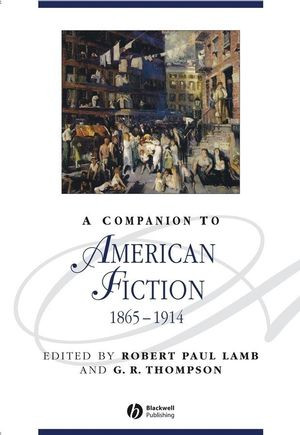A Companion To American Fiction 18651914 Robert Paul Lamb G R Thompson by Robert Paul Lamb, G. R. Thompson 9780470996829, 9781405100649, 047099682X, 1405100648 instant download after payment.
A Companion to American Fiction, 1865-1914 is a groundbreaking collection of essays written by leading critics for a wide audience of scholars, students, and interested general readers.
- An exceptionally broad-ranging and accessible Companion to the study of American fiction of the post-civil war period and the early twentieth century Brings together 29 essays by top scholars, each of which presents a synthesis of the best research and offers an original perspective
- Divided into sections on historical traditions and genres, contexts and themes, and major authors
- Covers a mixture of canonical and the non-canonical themes, authors, literatures, and critical approaches
- Explores innovative topics, such as ecological literature and ecocriticism, children’s literature, and the influence of Darwin on fiction
Content:
Chapter 1 The Practice and Promotion of American Literary Realism (pages 15–34): Nancy Glazener
Chapter 2 Excitement and Consciousness in the Romance Tradition (pages 35–52): William J. Scheick
Chapter 3 The Sentimental and Domestic Traditions, 1865–1900 (pages 53–76): Gregg Camfield
Chapter 4 Morality, Modernity, and “Malarial Restlessness”: American Realism in its Anglo?European Contexts (pages 77–95): Winfried Fluck
Chapter 5 American Literary Naturalism (pages 96–118): Christophe Den Tandt
Chapter 6 American Regionalism: Local Color, National Literature, Global Circuits (pages 119–139): June Howard
Chapter 7 Women Authors and the Roots of American Modernism (pages 140–148): Linda Wagner?Martin
Chapter 8 The Short Story and the Short?Story Sequence, 1865–1914 (pages 149–174): J. Gerald Kennedy
Chapter 9 Ecological Narrative and Nature Writing (pages 177–200): S. K. Robisch
Chapter 10 “The Frontier Story”: The Violence of Literary History (pages 201–221): Christine Bold
Chapter 11 Native American Narratives: Resistance and Survivance (pages 222–239): Gerald Vizenor
Chapter 12 Representing the Civil War and Reconstruction: From Uncle Tom to Uncle Remus (pages 240–259): Kathleen Diffley
Chapter 13 Engendering the Canon: Women's Narratives, 1865–1914 (pages 260–278): Grace Farrell
Chapter 14 Confronting the Crisis: African American Narratives (pages 279–295): Dickson D. Bruce
Chapter 15 Fiction's Many Cities (pages 296–317): Sidney H. Bremer
Chapter 16 Mapping the Culture of Abundance: Literary Narratives and Consumer Culture (pages 318–339): Sarah Way Sherman
Chapter 17 Secrets of the Master's Deed Box: Narrative and Class (pages 340–355): Christopher P. Wilson
Chapter 18 Ethnic Realism (pages 356–376): Robert M. Dowling
Chapter 19 Darwin, Science, and Narrative (pages 377–394): Bert Bender
Chapter 20 Writing in the “Vulgar Tongue”: Law and American Narrative (pages 395–410): William E. Moddelmog
Chapter 21 Planning Utopia (pages 411–427): Thomas Peyser
Chapter 22 American Children's Narrative as Social Criticism, 1865–1914 (pages 428–448): Gwen Athene Tarbox
Chapter 23 An Idea of Order at Concord: Soul and Society in the Mind of Louisa May Alcott (pages 451–467): John Matteson
Chapter 24 America Can Break Your Heart: On the Significance of Mark Twain (pages 468–498): Robert Paul Lamb
Chapter 25 William Dean Howells and the Bourgeois Quotidian: Affection, Skepticism, Disillusion (pages 499–517): Michael Anesko
Chapter 26 Henry James in a New Century (pages 518–535): John Carlos Rowe
Chapter 27 Toward a Modernist Aesthetic: The Literary Legacy of Edith Wharton (pages 536–556): Candace Waid and Clare Colquitt
Chapter 28 Sensations of Style: The Literary Realism of Stephen Crane (pages 557–571): William E. Cain
Chapter 29 Theodore Dreiser and the Force of the Personal (pages 572–585): Clare Virginia Eby


